|
|
| 'Like' us on Facebook | Follow us: |
Posted on: Apr 23, 2016
Life with God is an endless hope:
life without God is a hopeless end
- The life experience of Mr. Hari Hara Krishnan Part 3
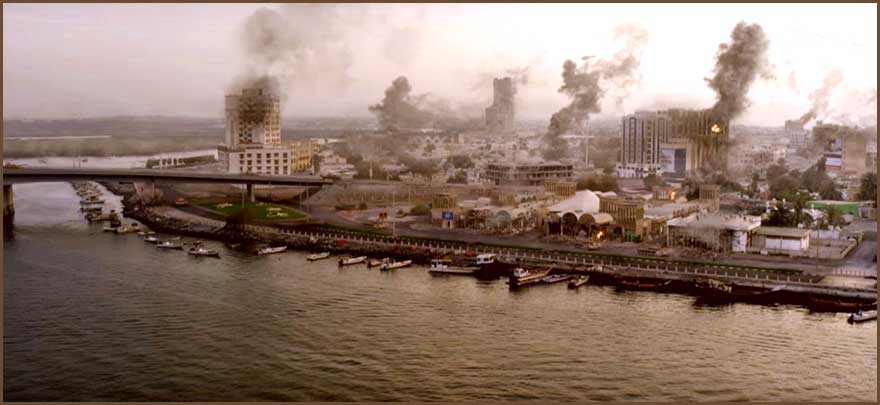 |
| The vastly opulent Kuwait City was under fire from Saddam Hussein’s Iraq (Screenshot from the movie, ‘Airlift’) |
Do your best and leave the rest to God
Hari and Ribhi Al Shaer had a detailed conversation on the getaway plan the next day. A rendezvous point was fixed and, from there on, Ribhi would guide the convoy of four cars towards the planned destination - Amman. The first car would naturally be the Mercedes Benz belonging to Ribhi. Hari with his cousin’s family would follow at a distance of hundred metres. The third car would be of Kirit Gandhi and family following Hari’s car at a distance of hundred metres. The final car would be housing Salim and his two friends. Ribhi said that he would not be able to wait at the rendezvous point since any waiting car could be checked (best case scenario), confiscated (normal case scenario) or bombarded (worst case scenario). The time of rendezvous was fixed for 9 August, 8:30 am. Since anything could happen along the journey, it was agreed that each ‘car’ could decide to break the convoy and head in the direction of its choice at any time during the journey.
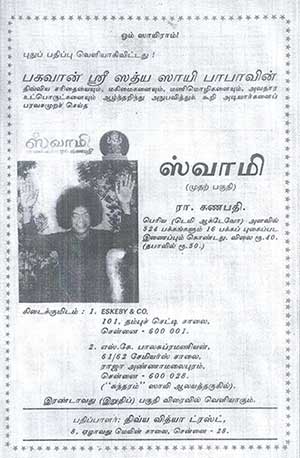 |
|
| The August 1990 issue of Mangayar Malar Magazine with the page that carried Swami’s photograph. (Picture courtesy: Mangayar Malar Archives) |
Having put his best foot forward in terms of the efforts, Hari went back to singing bhajans. It had now been five nights in a row that he had not slept. How could anyone get sleep in such situations? Normally, one is able to sleep at night because of the inherent confidence that one will wake up the next day. If there is a chance that the night’s sleep would be the last one of one’s life, one will not be able to sleep a wink. That was Hari’s condition; that was everyone else’s condition. Thus, the whole night resonated with the music of the heartfelt bhajans. Hours floated by and the only thing that everyone consumed that night was vibhuti. At the break of dawn, everyone silently readied themselves for the journey of their lives (or their deaths)!
The cars were all loaded with the necessities. It was at this time that Hari noticed a Mangayar Malar magazine at his cousin’s home. It was the August issue of the Tamil monthly magazine for women. The cousin had retained it to show Hari a photo of Swami that had appeared in the magazine. Hari saw the page. It was an advertisement for a book on Swami’s leelas, mahimas and teachings authored by Ra. Ganapathi. Most importantly for Hari, the page showed a picture of Swami raising both His hands in benediction. Just seeing it gave him courage and joy. He felt that Swami was reassuring him. Hari carried the magazine with him into the car and placed it on the dashboard.
His cousin was at the wheel. Padmanabhan’s children would definitely be scared going through a war-torn country. To keep them sleeping (and thus) peaceful, the children were given large doses of cough syrup.
Just before starting, Hari applied vibhuti to all his fellow-travellers while loudly chanting,
“Sai Ram! Sai Ram!”
After that, the convoy of three cars headed towards the rendezvous point where they hoped to meet Ribhi.
Venturing into the unknown - with JUST faith
Hari was in the lead car. As soon as they got on to the main road, he could hear firing going on. It was the Kuwaiti Resistance against the Iraqi occupation. It was decided that the windows of the car be raised to minimise the conflict sounds. The air-conditioner was turned on as was the BBC radio. It would be less frightening to hear about the war than hear the war!
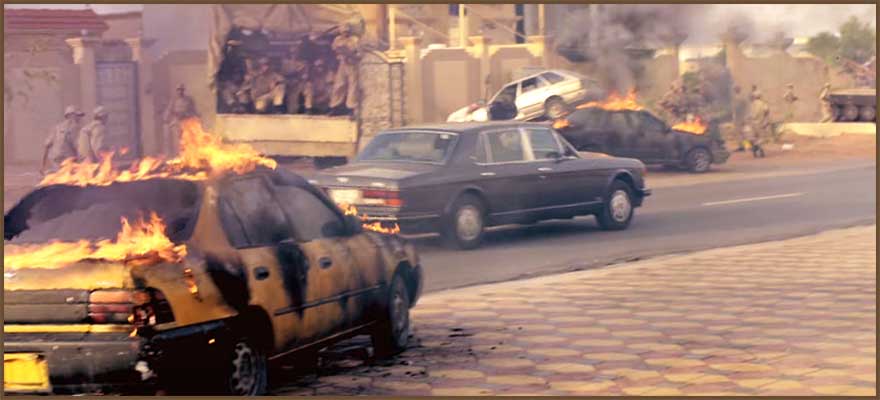 |
| From a logical point of view it was an insane decision to drive out of Kuwait (Screenshot from the movie, ‘Airlift’) |
Few minutes later, Hari noticed Ribhi’s car almost ambling along the road. Ribhi too must have noticed for he began to gather speed. Now, the four cars were in a convoy stretching over 400 meters. Ribhi’s car took a turn and entered the highway. Soon, the convoy was speeding at nearly 100 km/h.
In the car, the only sounds were that of the BBC radio. The passengers listened in bated breath, hoping to get some clue on what to do and where to drive. The BBC news broadcast was all bad. More than 100,000 Iraqi soldiers had got into Kuwait. Saddam Hussein was threatening to ‘turn Kuwait into a graveyard’ if any other country dared to challenge the takeover! The Emir’s younger brother had been killed and the Iraqi forces had set up roadblocks everywhere. None of the Arab countries had so far condemned the attack. In spite of repeated appeals from Kuwait, the international community was silent. All this was apparently giving Saddam the confidence to go on. But that shattered the confidence of the car passengers to go on! Added to this was the news that all exit points from Kuwait (and Iraq) had been sealed and even diplomats were not being allowed to leave the country!
Hari immediately pulled out the vibhuti packet. Again chanting ‘Sai Ram Sai Ram’ in full volume, he applied the holy ash to everyone’s forehead. That was their only source of strength and succour. Every time the BBC broadcast a demoralising statement, Hari would tell everyone to chant Swami’s name and apply vibhuti! Thanks to that strong faith, even the presence of tanks and machine-gun-brandishing soldiers did not make the cars turn around.
The story in the cars following Hari’s car was slightly different. They had no idea of what was happening or what would happen. But they had faith in their Hari’s faith in his Lord! They were saying to themselves,
“Hari’s Sai Baba will surely protect him. If we stay with him, we will be protected too!”
A devotee’s true faith can inspire the same in others as well!
 |
The convoy had moved about 100 kilometres from Salmiya when something unexpected happened. Ribhi’s car which was in the lead was flagged down by some military personnel. The car stopped. The rest of the convoy slowed down to a near-halt. Hari saw a military officer with a gun get into the front seat beside Ribhi. The car then moved on and the convoy followed. This was certainly a departure from the normal. What was going to happen?
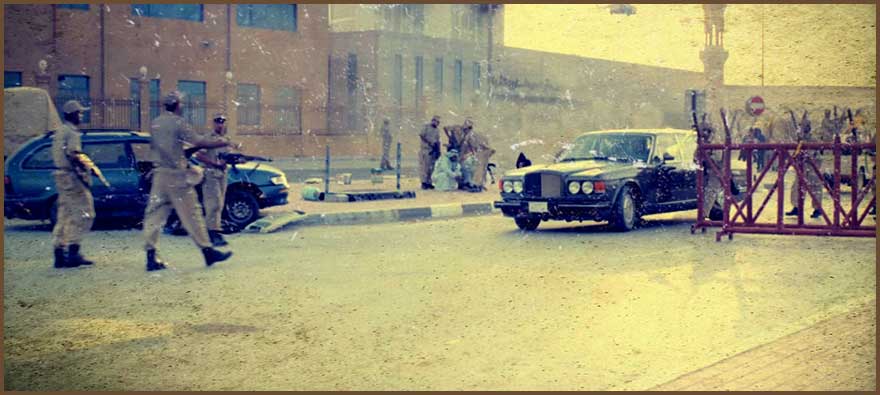 |
| Ribhi's Mercedes car was intercepted for an Iraqi officer (Screenshot from the movie, ‘Airlift’) |
A couple of kilometres later, a road junction appeared. Ribhi, with the military officer in the car, took a left and drove on.
“Take a right here”, said Hari to his cousin.
The board on the road announced that the road would lead to Basra in Iraq.
“Is this the route we are supposed to take?” asked Ananta Padmanabhan.
“I have no idea but I don’t know whether it is wise to follow Ribhi anymore. That Iraqi officer might take him straight to a military base. Let us go as far as possible away from him...”
Hari saw that the other two cars dutifully followed him. He now had the responsibility of all the three cars as Ribhi was no longer in the guiding position. But how was he to do it when he did not have even the slightest idea of the roads in Iraq? He had travelled extensively in the Middle East but had not even imagined travelling in Iraq. Now, he was ‘guiding’ a convoy of three cars through the unknown roads of a dictator-ruled country.
It was time for another round of loud “Sai Ram Sai Ram” chanting and application of vibhuti.
Checkpost #1 - Test Post #1
It was somewhere along the former Kuwait-Iraq border, 60 kilometres away from Basra, that they encountered the barricades of a checkpost. (At that point in time, Hari had no idea that this was the border. It was just a rude stop to their tense journey.)
From the windshield, Hari and his cousin saw a soldier armed with the AK-47 assault rifle walk up to them. The chants of “Sai Ram Sai Ram” rose to a crescendo in the car. With the vibhuti packet tightly clenched in his hand, Hari rolled down the glass. He got prepared to get pulled out of the car. The soldier came to the window and shocked everyone in the car with what he said.
“15 checkposts like this... Just raise your hand like this... Everyone will let you pass through.”
He raised his right hand in the popular ‘Hail’ pose. Saying this, the soldier turned and signalled for the checkpost gate to be raised. He didn’t ask anything else at all! Hari heaved a sigh of relief. He would not be dying here. The convoy of cars simply moved past the checkpost into Iraq.
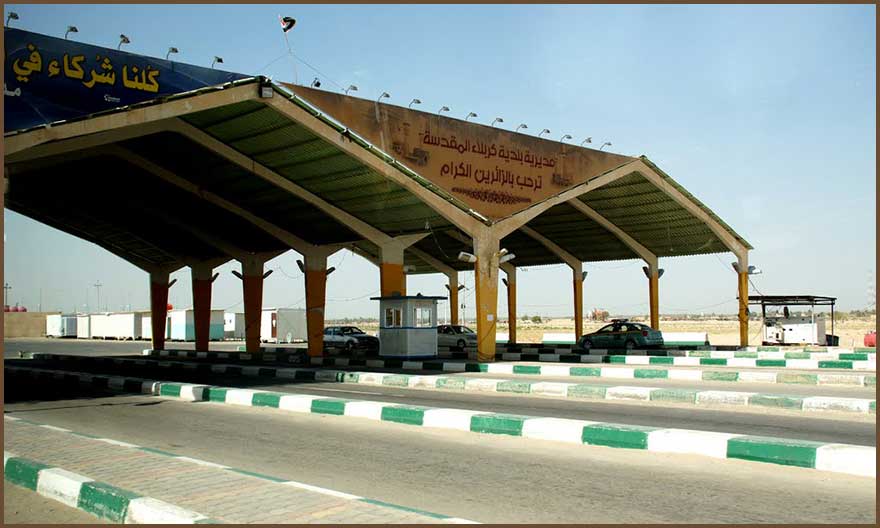 |
| A sample of a checkpost between Najaf and Baghdad in Iraq - Modern day photo |
Would it be the case of getting into the fire from the frying pan?
As they drove on, Hari realized with goose bumps on his skin that the soldier had told him to strike the Abhayahasta (the hand position in which most of the Indian Gods are depicted) pose. The Abhayahasta is very special for the Sai devotee for it is a reassurance from Swami,
“Why fear when I am here?”
Whenever a cross road appeared, Hari would just take the Lord’s name, apply vibhuti and turn in a direction that he felt from within. There were hardly any signboards. Even when they were there, they were not of much use for Hari did not know the slightest bit of Iraqi geography! It was a miracle in itself that they reached Basra. The cars were refuelled in an Iraqi gas station. Hari feared that the Kuwaiti registration numbers on the cars would give them away. But again, miraculously, nothing like that happened even when Hari paid for the fuel in Kuwaiti Dinars! Hari realised that it was not him but his Swami guiding and guarding the convoy.
The Iraqi port city of Basra is also the second largest city in Iraq after Baghdad. It is located on the Shatt al-Arab river (the root cause for the Iran-Iraq conflict). Though the city had a great cultural and spiritual past, it had suffered a lot in the last decade. Saddam had converted this into an Iraqi stronghold, erecting 99 memorial statues to Iraqi commanders killed during the war along the bank of the Shatt al-Arab river, all pointing their fingers towards Iran! Hari and company were in this city now and they drove to a hotel. Making a brief halt in the lobby outside the restaurant, they decided to eat the idlis that they had packed in Kuwait.
Harati Nimeshat Kalah Sarvam (Time can snatch away everything in a moment)
One of the most poignant moments of Hari’s life took place in this battle-torn yet beautiful city. He decided to stroll over to a store in the lobby of the hotel with his cousin and purchase some water and biscuits. He was in mortal fear about how people would react if and when they got to know that they had arrived from Kuwait. However the store owner seemed warm and nice. He carefully calculated and counted 190 Iraqi Dinars as change for the 20 Kuwaiti Dinars that Hari paid him for the water bottles and biscuits. Hari wanted to buy about 20 litres of water. But he decided against it as he thought it might arouse suspicion.
Just as they were turning around to return to the car, Hari saw a scene that seemed to punch him in full force in the gut.
A Kuwaiti citizen with his wife and two kids came to the store. Though taken by shock by the invasion, he still had the Kuwaiti-confidence that comes from extreme wealth. He asked for the same things like Hari - bottled water and biscuits. The store owner seemed alarmed and he simply refused to serve a Kuwaiti. (If Saddam’s military got wind of any help being given to a Kuwaiti to escape Kuwait, it would be the end of the helper!)
The Kuwaiti turned and opened the surprisingly large suitcase he was carrying. Hari’s jaw dropped as he saw wads and wads of Kuwaiti Dinars stacked neatly inside it. That suitcase alone was enough to make one into a multi-millionaire! The Kuwaiti pulled out a wad of notes and offered it to the store owner. (Hari estimates that it was about 100 Kuwaiti Dinars, the equivalent of US $7000 or Rs 4.35 lakhs - all for water and biscuits!) On any other day, that much money could have bought the entire store. But today, the times were different! The store owner threw back the wad of notes as though it was death itself. His face turned red in anger.
“I know you are a Kuwaiti trying to run away. I shall call the police right away...”
He picked up the receiver of the telephone and began to dial a number.
The Kuwaiti person quickly put the wad of notes back into the suitcase. Grabbing it in a hand and holding his child’s hand in the other, he made a dash. His wife and the other kid also followed him, running for their lives.
At that moment, Hari had a painful epiphany.
“Swami, what is the use of the wealth that can’t stop you from becoming a beggar in one instant? What is the use of a currency that is not accepted? All those millions are unable to gift that gentleman even a glass of water!”
And the irony was that the Kuwaiti still held on to the suitcase like he held on to dear life!
“Swami”, Hari continued with tears in his eyes, “let me earn that currency which is accepted in your kingdom. All other currency become waste-paper in moments. I shall never ever pursue worthless paper.”
 |
The great Shankaracharya in his Bhaja Govindam warns man against having pride of wealth, youth and influence because time can take away these things in moments (Harati Nimeshat Kalah Sarvam). Hari had seen a practical demonstration of how time can take away wealth in a matter of moments. The tears continued to stream down his cheeks as he walked back to the car. Swami had taught him a lesson in the city of Basra that lifetimes are unable to teach for many people.
The journey through Iraq
The car had been refuelled. The bodies had been satisfied with idlis, biscuits and water. Hari’s spirit had been strengthened with the lesson of a lifetime. The kids were given another dose of the cough syrup as the convoy set off for the journey through Iraq.
As told by the soldier at the first checkpost, several military-manned posts came on the way. The journey from the city of Basra to the city of Najaf took almost 5 hours. From there, in another hour, the convoy reached the holy city of Karbala. By this time, Hari was totally overwhelmed with Swami’s love that had showered on them via two miracles.
1. None of the checkposts posed any problem for the convoy. Even as the cars were stopped, Hari would raise his right hand in Abhayahasta pose to the soldiers. Without a murmur, the gates would be opened and the convoy would be allowed to pass through. Hari began to maintain a count of the checkposts knowing that the fifteenth one would be the last one.
2. They had driven more than 600 kilometres in a terrain that was familiar to nobody. Yet, they had not gone on A SINGLE WRONG ROAD! The guide map had been “Sai Ram Sai Ram” and the distance markers had been the application of Vibhuti! The convoy was perfectly on track towards its ultimate destination - Amman. Hari was convinced that this had to be the biggest miracle of the day.
He had another epiphany.
“Swami, I realize that just like You have guided us in this escape journey, You also guide us in our life-journey where we are trying to cross the Bhavasagara (ocean of illusory and worldly existence). We just have to place our faith in You and do Namasmarana!”
It was the sunset time in Karbala when the convoy reached there. Though all the passengers were scared and fatigued, none of them felt sleepy. It was the 7th day without sleep for Hari and he was himself amazed at the miracles that the human body is capable of. But he had not the slightest idea that the biggest miracles were yet to come. They would come at a time when Hari needed them the most.
- Aravind Balasubramanya
Radio Sai Team
What do you think about this Article? Please let us know by writing in to h2h@radiosai.org or you may leave your thoughts in the comments section. Do not forget to mention your name and country.
| comments powered by Disqus |






